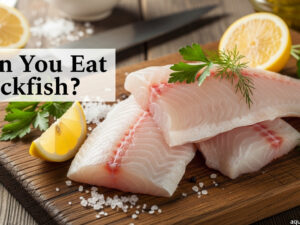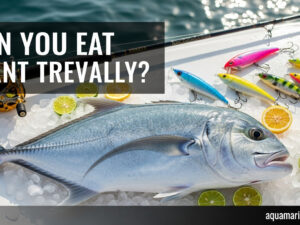Yes, you can absolutely eat kingfish! Also known as king mackerel, kingfish is not only safe to consume but offers exceptional nutritional value and a unique flavor profile that many seafood enthusiasts love. This popular game fish provides high-quality protein, omega-3 fatty acids, and essential vitamins that support overall health.
However, like many large predatory fish, kingfish requires proper preparation and consideration of mercury levels for safe consumption. When sourced from clean waters and prepared correctly, kingfish makes an excellent addition to any seafood lover's menu.
This comprehensive guide covers everything you need to know about eating kingfish, from taste and texture to nutritional benefits and safety considerations. You'll discover preparation methods, health implications, and expert tips for getting the most from this versatile fish.
What Does Kingfish Taste Like?
Kingfish has a rich, pronounced flavor with firm, oily flesh that's distinctly different from milder white fish. Many people compare the taste to common mackerel since they belong to the same species family. The flavor is robust and savory, with a slight "fishy" taste that seafood enthusiasts appreciate.
The texture of kingfish is notably firm and meaty when raw, but becomes tender and flaky when properly cooked. The flesh has natural oils that keep it moist during cooking, making it forgiving for novice cooks. Unlike delicate fish that fall apart easily, kingfish holds together well during grilling, baking, or pan-frying.
King Mackerel Fish Taste Profile
The specific taste characteristics of kingfish include:
- Bold, oceanic flavor - More pronounced than mild fish like cod or tilapia
- Slightly oily texture - Natural oils prevent dryness during cooking
- Firm, meaty consistency - Comparable to tuna or shark in texture
- Sweet undertones - Particularly noticeable when fish is very fresh
- Clean finish - No muddy or off-flavors when sourced from quality waters
Fresh kingfish tastes significantly better than frozen varieties. The natural oils in kingfish break down quickly, so consuming within 24-48 hours of catching provides the optimal flavor experience. Fish from colder, cleaner waters generally taste better than those from warm, murky environments.
King Fish Nutrition Facts 100g
Per 100 grams of raw kingfish, you'll receive exceptional nutritional value with minimal calories. This nutrient-dense fish delivers high-quality protein and essential fatty acids without excess carbohydrates or sugars.
Complete Nutritional Breakdown (100g Raw):
| Nutrient | Amount | % Daily Value |
|---|---|---|
| Calories | 105 | 5% |
| Protein | 20.3g | 41% |
| Total Fat | 2.0g | 3% |
| Saturated Fat | 0.4g | 2% |
| Cholesterol | 53mg | 18% |
| Sodium | 158mg | 7% |
| Selenium | 36.5mcg | 66% |
| Vitamin B12 | 2.9mcg | 121% |
| Niacin (B3) | 8.1mg | 51% |
| Omega-3 Fatty acids | 0.34g | 21% |
Cooked King Fish Nutrition Facts
When cooked using dry heat methods, the nutritional profile changes slightly:
- Calories increase to 134 per 100g due to moisture loss
- Protein concentrates to 26.0g (52% daily value)
- Fat content remains at 2.6g with beneficial omega-3s intact
- Selenium increases to 57% daily value per serving
The cooking process concentrates nutrients while maintaining the fish's health benefits. Grilling, baking, or broiling preserves the most nutritional value compared to deep-frying methods.
Is Kingfish Healthy to Eat?
Kingfish is exceptionally healthy to eat and provides numerous benefits for cardiovascular health, brain function, and overall wellness. This nutrient-dense fish ranks among the healthiest seafood choices when consumed as part of a balanced diet.
King Fish Health Benefits
The impressive health benefits of eating kingfish include:
Heart Health Support Kingfish contains significant amounts of omega-3 fatty acids (EPA and DHA) that help reduce inflammation and support cardiovascular health. These essential fats help lower blood pressure, reduce triglyceride levels, and decrease the risk of heart disease.
Brain Function Enhancement The omega-3 fatty acids in kingfish support cognitive function and may help prevent neurodegenerative diseases. Vitamin B12 is crucial for maintaining healthy brain and nervous system function.
Immune System Boost High selenium content acts as a powerful antioxidant, supporting immune system function and protecting cells from oxidative damage. Selenium also supports thyroid health and hormone regulation.
Muscle Development With over 20 grams of high-quality protein per 100g serving, kingfish provides all essential amino acids needed for muscle repair and growth. This makes it excellent for athletes and active individuals.
Weight Management At only 105 calories per 100g serving, kingfish provides satisfying protein that helps maintain healthy weight. The protein content promotes satiety and supports healthy metabolism.
Bone Health Kingfish provides vitamin D and phosphorus, both essential for maintaining strong bones and teeth. These nutrients work together to improve calcium absorption.
Does Kingfish Eat Shellfish?
Yes, kingfish do eat shellfish as part of their natural diet. According to marine biologists, king mackerel are opportunistic carnivores that feed on a diverse diet including fish, squid, and various crustaceans including shrimp and other shellfish.
Natural Diet of Kingfish
The natural feeding habits of kingfish include:
- Primary diet: Small schooling fish (anchovies, sardines, herring, ballyhoo)
- Secondary foods: Squid, shrimp, and other crustaceans
- Seasonal variations: Diet changes based on prey availability and migration patterns
- Hunting behavior: Aggressive predators that often leap from water pursuing prey
Adult kingfish typically consume fish measuring 3.9-5.9 inches, but they'll opportunistically feed on available shellfish when fish populations are less abundant. Their varied diet contributes to their robust nutritional profile, as they consume omega-3 rich prey species.
Juvenile kingfish show different feeding patterns, consuming more small invertebrates including various shellfish species. This dietary diversity helps explain why kingfish accumulate such high levels of nutrients and unfortunately, mercury from the food chain.
Mercury Concerns and Safety Guidelines
Kingfish contains elevated mercury levels that require careful consideration for safe consumption. The FDA classifies king mackerel among the four fish species (along with swordfish, shark, and tilefish) that require consumption limits due to mercury content.
Mercury Safety Recommendations
For Adult Men:
- Limit consumption to less than one serving per month
- Choose smaller fish when possible (lower mercury accumulation)
- Avoid fish weighing over 30 pounds
For Women and Children:
- Pregnant women should avoid kingfish entirely
- Women who might become pregnant should avoid kingfish
- Children under 12 should not consume king mackerel
- Nursing mothers should avoid kingfish
Why Kingfish Contains High Mercury
Kingfish accumulate mercury because they're apex predators with long lifespans. As they consume smaller fish over many years, mercury bioaccumulates in their tissues. Larger, older kingfish contain significantly more mercury than smaller specimens.
The mercury concentration increases with:
- Fish size and age (20+ year lifespan allows significant accumulation)
- Position in food chain (eating mercury-containing prey)
- Water pollution levels in their habitat
- Geographic location and seasonal variations
How to Prepare Kingfish for Best Taste
Proper preparation dramatically improves kingfish flavor and reduces any strong "fishy" taste. The key lies in removing dark meat, proper handling, and choosing appropriate cooking methods.
Essential Preparation Steps
Remove the Bloodline The dark red muscle tissue along the fish's sides contains the strongest flavors and potential off-tastes. Carefully cut away all dark meat to achieve milder, more appealing flavor.
Immediate Icing Place kingfish on ice immediately after catching or purchasing. The natural oils break down rapidly at room temperature, leading to strong flavors and unpleasant texture.
Fresh Only Rule Never freeze kingfish if you plan to eat it. Freezing destroys the texture and intensifies undesirable flavors. Consume within 24-48 hours for optimal taste.
Best Cooking Methods
Grilling (Recommended)
- Cut into 1.5-inch thick steaks
- Marinate in Italian dressing or lime juice for 20-30 minutes
- Grill over medium heat for 4-5 minutes per side
- Brush with olive oil and herbs while cooking
Smoking (Most Popular)
- Remove all dark meat and cut into manageable pieces
- Brine with salt and brown sugar for 2-4 hours
- Smoke at 225°F for 2-3 hours until flaky
- Perfect for making fish dip or pâté
Pan-Seared
- Season fillets with blackening spice or simple salt and pepper
- Heat cast iron pan with olive oil over medium-high heat
- Sear 3-4 minutes per side until golden brown
- Finish with butter, lemon, and fresh herbs
Comparing Kingfish to Other Popular Fish
Understanding how kingfish compares to best freshwater fish taste options helps set proper expectations for flavor and preparation.
Taste Comparison Chart
| Fish Species | Flavor Intensity | Texture | Oil Content | Mercury Level |
|---|---|---|---|---|
| Kingfish | Strong | Firm/Meaty | High | Very High |
| Bass | Mild | Flaky | Low | Moderate |
| Crappie | Very Mild | Tender | Very Low | Low |
| Walleye | Mild | Firm | Low | Low |
| Salmon | Moderate | Firm | High | Low |
Unlike the jack fish species that offer milder flavors, kingfish requires specific preparation techniques to appeal to a broader audience. However, its rich nutrition profile makes the extra effort worthwhile.
Regional Preparation Styles
Different coastal regions have developed unique approaches to preparing kingfish based on local preferences and available ingredients.
Gulf Coast Style
- Heavy use of Cajun spices and blackening techniques
- Often prepared as fish dip mixed with cream cheese and seasonings
- Smoking over pecan or hickory wood for distinct flavor
Atlantic Coast Method
- Italian dressing marinades to reduce fishy taste
- Grilling wrapped in bacon for added flavor and moisture
- Serving with fennel salads and lemon-based sauces
Caribbean Preparation
- Jerk seasoning and lime-based marinades
- Curry preparations with coconut milk
- Escovitch-style with pickled vegetables
Nutritional Comparison with Saltwater Fish Types
When comparing kingfish to popular aquarium and food fish, the nutritional advantages become clear:
- Higher protein than most aquarium species
- Superior omega-3 content compared to freshwater fish
- Excellent selenium levels for antioxidant protection
- Rich B-vitamin complex for energy metabolism
However, the mercury content distinguishes kingfish from safer cold water fish options that can be consumed more frequently.
Sustainable Fishing and Conservation
U.S. wild-caught king mackerel is considered a sustainable seafood choice when harvested following current regulations. NOAA Fisheries reports that both South Atlantic and Gulf of Mexico stocks are not overfished and not subject to overfishing as of 2025.
Conservation efforts since the 1980s have successfully restored kingfish populations from historical lows. Regulations implemented in 1983 control harvest through:
- Size limits (minimum sizes vary by region)
- Bag limits for recreational anglers
- Seasonal closures during spawning periods
- Commercial quotas and monitoring
When purchasing kingfish, choose suppliers who follow sustainable fishing practices and support properly managed fisheries.
Common Preparation Mistakes to Avoid
Many people who dislike kingfish have experienced poorly prepared fish. Avoid these common errors:
Mistake #1: Keeping the Bloodline Dark muscle tissue creates the strongest, most unpleasant flavors. Always remove completely.
Mistake #2: Overcooking Kingfish becomes dry and tough when overcooked. Cook just until it flakes easily.
Mistake #3: Using Old Fish Never eat kingfish more than 48 hours after catching. The oils deteriorate rapidly.
Mistake #4: Wrong Cooking Method Deep-frying adds unnecessary oil to already fatty fish. Stick to grilling, smoking, or searing.
Mistake #5: No Marination Brief marination in acid (lime juice) or Italian dressing significantly improves flavor.
Storage and Handling Tips
Proper storage extends kingfish quality and ensures food safety:
Fresh Fish Storage
- Keep on ice at 32-38°F constantly
- Use within 24-48 hours for best quality
- Store in coldest part of refrigerator
- Wrap in plastic to prevent odor transfer
Preparation Safety
- Use clean cutting boards and knives
- Wash hands thoroughly before and after handling
- Don't cross-contaminate with other foods
- Cook to internal temperature of 145°F
Leftover Management
- Refrigerate cooked kingfish within 2 hours
- Consume within 3-4 days when properly stored
- Reheat to 165°F before serving
- Smoked kingfish can be frozen for fish dip recipes
Expert Tips for First-Time Kingfish Eaters
If you're trying kingfish for the first time, these expert suggestions will ensure a positive experience:
Start Small
Try kingfish prepared by an experienced cook first. Restaurant preparations or guided cooking sessions help you understand proper flavor profiles.
Choose Smaller Fish Kingfish under 20 pounds generally have milder flavor and lower mercury levels. Avoid large trophy fish for eating purposes.
Perfect Your Marinade
Soak cleaned fillets in buttermilk for 30 minutes, then marinate in Italian dressing. This combination significantly reduces strong flavors.
Control Your Expectations
Kingfish isn't a mild white fish. Expect robust, oceanic flavors similar to tuna or mackerel family fish.
Have a Backup Plan
If the flavor proves too strong, use the cooked fish for strongly seasoned dishes like fish tacos, curry, or smoked fish dip.
Frequently Asked Questions About Eating Kingfish
Is kingfish better than other fish nutritionally?
Kingfish offers superior protein and omega-3 content compared to most freshwater species. However, mercury concerns limit consumption frequency compared to safer alternatives like salmon or sardines.
Can you eat kingfish skin?
Yes, kingfish skin is edible and becomes crispy when grilled properly. Some consider it a delicacy, though removing it reduces overall fishiness.
What's the best size kingfish to eat?
Fish between 12-25 pounds offer the best balance of flavor and safety. Smaller fish have milder taste, while larger fish contain more mercury.
How often can adults eat kingfish?
Adult men should limit consumption to less than one serving per month. Women of childbearing age and children should avoid kingfish entirely.
Does cooking method affect mercury levels?
No, cooking doesn't reduce mercury content. However, proper preparation removes other contaminants and improves digestibility.
The Bottom Line: Should You Eat Kingfish?
Kingfish can be delicious and nutritious when properly prepared, but mercury concerns require careful consideration. For adult men seeking variety in their seafood consumption, occasional kingfish meals provide excellent nutrition and unique flavors.
The rich taste and firm texture make kingfish perfect for smoking and strong-flavored preparations. When sourced fresh and prepared correctly by removing dark meat, kingfish offers a premium seafood experience that rivals expensive restaurant fish.
However, the high mercury content makes kingfish unsuitable for regular consumption or for vulnerable populations including pregnant women and children. Consider kingfish a special occasion fish rather than a dietary staple.
For those seeking similar nutritional benefits without mercury concerns, consider salmon, sardines, or other low-mercury alternatives that can be consumed more frequently.
Whether you choose to eat kingfish depends on your personal risk tolerance, taste preferences, and access to quality preparation methods. When handled properly, kingfish provides a memorable and nutritious seafood experience that showcases the ocean's bounty at its finest.
Ready to explore more about sustainable seafood choices? Discover our comprehensive guides to bottom feeder fish and learn about the fascinating world of catfish noodling for your next fishing adventure.



